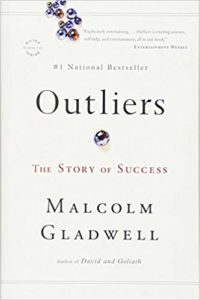Outliers, by Malcolm Gladwell
 The American Dream is that anyone, if they work hard enough, is able to make it to the top. Everyone has equal opportunity, and it’s up to them to make the most of it.
The American Dream is that anyone, if they work hard enough, is able to make it to the top. Everyone has equal opportunity, and it’s up to them to make the most of it.
In his book Outliers, Malcolm Gladwell challenges this American understanding of how we attain success.
He takes a deep dive and investigates success in a variety of fields—from the composition of elite hockey rosters to the health of an Italian community in Pennsylvania to the musical talent of the Beatles to the wealth of Bill Gates and Steve Jobs. He asks, What do they all have in common?
As he masterfully presents stories of success, a pattern begins to emerge: success is more than the American Dream. Yes, you need to be diligent, and yes, you need to work hard, but success, Gladwell argues, emerges out of timing and circumstances as much as talent and effort.
Here’s a brief vignette.
Canadian psychologist Roger Barnsley noted that on any elite Canadian hockey team, 40% of the players will have been born between January and March, 30% between April and June, 20% between July and September, and 10% between October and December.
That’s an incredibly disproportionate distribution of birthdays.
Why? Relative age.
The cutoff birthday for organized Canadian hockey is January 1. Players born in the first quarter of the year are older. Now that doesn’t mean much for a professional player at age 21, but at age 4 or 5, when most elite hockey players get their start, it’s a massive difference. If you turn 4 on January 1 and your friend turns 4 on October 1, you are 9 months older. That means you’re 9 months stronger, faster, and more coordinated.
As a result, you are selected for the extra teams—all-star teams, travelling teams, etc.—which means more time on the ice, a rare commodity. More time on the ice gives you more practice, and so the gap widens. Your initial advantage gives you even more advantage.
Unintentionally but with profound impact, the system selects against those born later in the year. It selects for those who are born in January.
Success in Canadian hockey does have to do with individual skills, but the system determines who has time to shape those individual skills. Someone born in January is four times more likely to develop into an elite hockey player than someone born in December.
By demythologizing the individualism of the American Dream, Gladwell opens our eyes to the way systems play a part in our success. And that’s a game changer.
